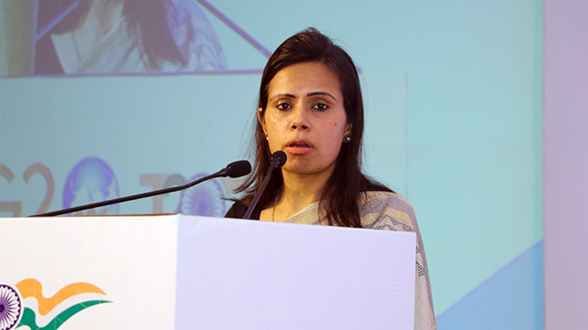Eenam Gambhir, Joint Secretary, G20 Secretariat, Ministry of External Affairs, India, and co-chair of the G20 Development Working Group, delivered the valedictory address at the T20 India Inception Conference held in New Delhi.
Thanking the eminent group of experts from global think tanks, research institutions, and members of Think20 task forces, Ms. Gambhir expressed that she felt encouraged by this great start to a very important year for India and the world, at large. The Think20 India Inception Conference coincided with another historic event, the first ever Voice of Global South Summit, hosted by India under the leadership of Prime Minister Narendra Modi.
In her address, Ms. Gambhir reiterated that the pandemic, exacerbated by geopolitical conflicts, had resulted in insecurities in supply and distribution of three most critical products across markets—food, fuel, and fertilisers. With worrying indicators coming in on reversal of the progress on SDGs, countries around the world today were confronted with diminishing hopes of their people.
Global South countries face multiple challenges of protectionist policies, fragile and overworked social support and health systems, and an uncertain future with little in reserves. The archaic setup of multilateral institutions has led to limited access to international markets and inadequate financing mechanisms, further restricting the growth prospects of the Global South. Unfair debt burdens have led to policy failures wherein the international financial institutions and the multilateral development banks have been watching from the side-lines. This needs to change.
She insisted on the need for strong multilateral action backed by the weight of international institutions to initiate a just transition to green growth for all. Development agenda should no longer be seen as a moral obligation. Its interlinkages and interconnectedness to issue of peace, security, and sustainability should be recognised as a priority. The world will find a way to emerge out of the divisions the world is facing.
As multiple geopolitical contestations create ripples across economies, the world is becoming increasingly fraught with global energy and food crises and the challenges associated with an unequal recovery from the pandemic. All of these factors only serve to aggravate the impacts or vulnerabilities of the ever-looming climate crisis. To tackle these challenges effectively, there is an urgent need to revive the trust between the Global North and the Global South, striving to find consensus on issues of green growth, sustainable development, and overall well-being of individuals. To this effect, Ms. Gambhir commended the Bali G20 Leader’s Declaration adopted at the conclusion of the Indonesian Presidency as an admirable success for the G20, bringing critical issues associated with climate action of the G20 into the mainstream and galvanising consensus on these issues.
The Indian G20 Presidency promises to be ‘action-oriented’ and shall work to secure a Green Development Pact of G20 leaders which will be a blueprint for the strong actions for the next decade powering green development all over the world, specifically in developing countries. This can be achieved through investments in sustainable lifestyles, leveraging green hydrogen for climate action, circular economy, and accelerating progress on SDGs, among other things. While highlighting the scope for Mission LiFE, she acknowledged that it is unfair to put the onus of going green on the consumer. There is a need to seek green development and green production at scale to ensure sustainability.
Ms. Gambhir also discussed the plans to drive action on transformative areas such as digital, just green transition, and women empowerment. These can become critical enablers to achieve SDGs. Acknowledging that the countries share an interconnected future and envisioning the world as one family, working towards a human-centred globalisation paradigm can help mitigate the perceived trade-offs between growth and sustainability. The Indian aspiration is to create strong coalitions and resilient health systems to prevent and protect the world from future pandemics.
Debt distress and poverty in developing countries are other critical issues that can be mitigated through anchoring our efforts on the principles of equity and ‘Common But Differentiated Responsibility’. This shall be fundamental to the sustainability of multilateral actions going forward. Through its presidency of the G20, India would also strive to create robust, new institutions to generate innovative, multi stakeholder partnerships for transformative transitions in key areas—health, education, women empowerment—fuelled by technology and citizen participation.
Watch the full address here.
This event report has been compiled by Debosmita Sarkar, Junior Fellow, CNED, ORF.




